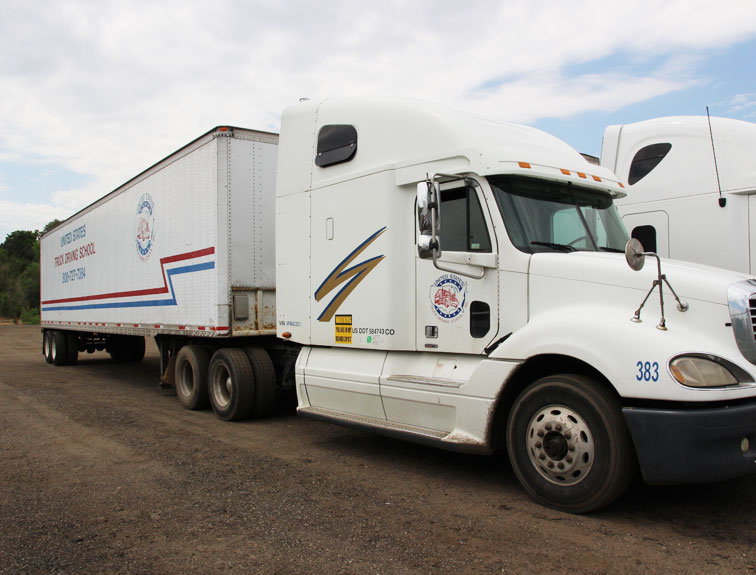New to the trucking industry? Here are 7 tips every new driver needs to know.

So you’re ready to be a truck driver, huh? Of course, you are. If you’re in truck driving school, chances are you’re chomping at the bit to get out of the practice truck and get into a truck that will help you earn a living.
Barr-Nunn Transportation driver Dave Casanova has been climbing into the cab of a truck for 18 years and has years of experience on both the general freight and expedited side of the trucking business. In other words, he has some insights to offer aspiring and beginning drivers.
Casanova offered his things that every new truck driver needs to know, whether it’s managing the job, the expectations surrounding the job, and how to build experience that counts in the industry.
1. Trucking is more mental than physical.
Managing your own mental state is the secret to trucking success. “It can be a very frustrating and depressing job if you don’t carry the right mindset,” he said. “For some people, being away from the family weeks at a time can quickly become unmanageable.”
2. Don’t expect the world right out of the gate.
It’s not realistic to expect your dream job right out of trucking school. “The first job you get out of school most likely won’t be the one you stay at for 20 years,” Casanova said. “This first job is where you should be learning about everything you need to be safe and compliant. This first job is where you start building a reputation for yourself as a safe compliant driver.” Find a “Mr. Right Now” job for your first gig, then look for “Mr. Right” after you’ve gained a little experience.
3. It takes about a year to “get it.”
Things may feel a little chaotic during the first year, as you struggle to remember all of the sometimes complex rules and regulations of the trucking industry. “To get a good handle on all the rules you need to be familiar with takes about a year,” he said. “The 3 biggest points to focus on are following distance, knowing the Smith System of driving, and trip planning. Remember that 80,000-lb. rigs don’t stop quickly and can’t be turned around as readily as a car when you miss a turn.”
4. Year One goal: no accidents.
In the midst of that first year, focus on safety. Simply finishing the year accident-free can in itself be a victory. Casanova suggests living the time-tested safety rule: “G.O.A.L. Get Out And Look,” he said. “Anytime you need to back up, you absolutely need to get out of the rig and check out your surroundings to avoid backing accidents.”
5. Know your career goals.
Know what you have, what you need, and what you want from your career, and have specific set goals. “Decide what you want out of this career,” he said. “Are you looking for maximum income? Is Home time a top priority? What benefits or health insurance do you need to make you happy? Once you’ve got an idea of what you need to be happy, you can research companies efficiently.”
6. Don’t job hop.
Many young people switch jobs frequently in their first year, looking for the next possible big opportunity. As much as it’s not the greatest strategy outside of the trucking industry, it decidedly is not inside it, where time of service matters greatly. “The fewer number of times you change jobs, the more likely you will wind up at a top-paying carrier,” he said. “Doing your homework prior to jumping ship is crucial if your goal is working for a top tier carrier at some point.”
7. It’s all about attitude.
Remember that even with a driver shortage, remember that you are not the hot commodity you think you are. A carrier/driver relationship should be built on mutual benefit. “I don’t believe there is a shortage of drivers. I believe there is a shortage of good drivers. Casanova said. “You want to continue to grow your reputation. By bringing a good attitude, when things get slow, you increase your chances of being a driver that gets taken care of. Be a good driver and reap the rewards.”
BONUS! — Find a mentor. Or, better yet, mentors.
Find a few industry veterans to get advice from on the road. You want good solid resources that will help keep you from making common rookie mistakes. “Experienced drivers can be a wealth of knowledge. By finding a few that you trust to tell it to you straight, you stand to gain a lot. As you earn experience you can bounce ‘what ifs’ off of them, to see how they would handle different situations. Keep in mind though, not every experienced driver can be a mentor. You really need to be selective of whom you take advice from.”
So, drivers… what do you wish someone told you before you hit the road? Share your tips and advice with our students and graduates on our Facebook page!


